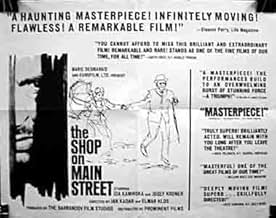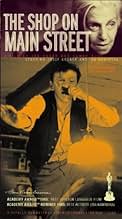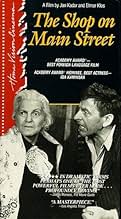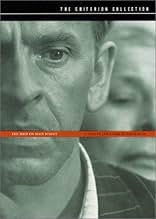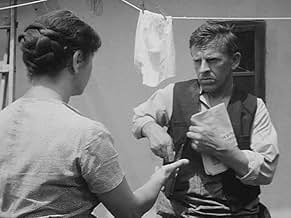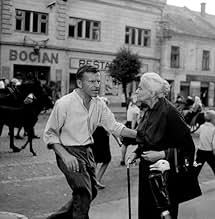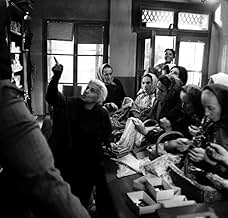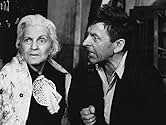NOTE IMDb
8,2/10
10 k
MA NOTE
Ajouter une intrigue dans votre langueA carpenter in the Fascist Slovak State is appointed "Aryan controller" of a Jewish widow's store.A carpenter in the Fascist Slovak State is appointed "Aryan controller" of a Jewish widow's store.A carpenter in the Fascist Slovak State is appointed "Aryan controller" of a Jewish widow's store.
- Réalisation
- Scénario
- Casting principal
- Récompensé par 1 Oscar
- 6 victoires et 4 nominations au total
Ida Kaminska
- Rozalia Lautmannová
- (as Ida Kaminská)
Frantisek Zvarík
- Markus Kolkocký
- (as Frantisek Zvarík)
Ladislav Farkas
- Young Man
- (non crédité)
Luise Grossová
- Eliasová
- (non crédité)
Juraj Herz
- Jewish Man
- (non crédité)
Avis à la une
This film is one of the most gripping stories told about Nazi occupied Europe. A small town in 1942 Czechoslovakia feels the changing regime envelop the people, pinning friends against one another, and turning even the most pacifistic men into traitors. Small-time carpenter Tony is married to an attractive, but constantly nagging and complaining, materialistic woman. Seeing her in-laws successful, while exploiting the political advantages of working with the Nazis, makes Tony's wife ever more determined to have a "piece of the fortune" the Jews are said to have been hording. Although refusing to work at a "tower of Babel" the Nazis are erecting as a symbol of their glory (and doing without the money he could have earned), Tony doesn't speak out against the "new order" either.
When Tony finds himself as assistant to an old lady at her failing notions shop (which he "legally" was entitled to take over), he learns about the Jewish community, how everyone looked out for one another, and how these people were no different from other folk in town, if anything they were more human than the rest. Still afraid of retribution from the Nazis and their sympathisers, Tony is in a no-win-situation.
The final scene of this 1966 Best Foreign Film Oscar Winner was likely an inspiration for the final scene in the 1997 Blockbuster "Titanic". This cinematic gem serves as a reminder to the old German saying "Leben und leben lassen" (live and let live). A classic indeed!
When Tony finds himself as assistant to an old lady at her failing notions shop (which he "legally" was entitled to take over), he learns about the Jewish community, how everyone looked out for one another, and how these people were no different from other folk in town, if anything they were more human than the rest. Still afraid of retribution from the Nazis and their sympathisers, Tony is in a no-win-situation.
The final scene of this 1966 Best Foreign Film Oscar Winner was likely an inspiration for the final scene in the 1997 Blockbuster "Titanic". This cinematic gem serves as a reminder to the old German saying "Leben und leben lassen" (live and let live). A classic indeed!
Words can hardly do justice to this gem. Understated cinematic grandeur, ultimate moral subtlety, acting without pair in the annals of movie history, philosophical and ethical depth without sententiousness . . . should I invent new superlatives to describe this indescribably touching movie?
Yes, the movie has to do with the tragedy of Jewish people in the poisoned and poisonous Europe of the WWII period, but the emotional implications go much farther than that. They address human condition in general. It is one of those egregiously few movies which make a "philosopher" out of each of us. . . even if for a minute only. . . even if we only philosophize with our unstoppable tears. I am not one to weep easily at movies, but I defy you to watch this fabulous work of cinema without being touched to the deepest fiber of your soul.
Yes, it is that good. One of the very few movies which are better than GREAT MUSIC. Watch it - preferably on the Criterion DVD, the VHS edition leaves a lot to be desired. Unless you are an unfeeling freak, no offense intended, it is very unlikely that you will ever regret it.
Yes, the movie has to do with the tragedy of Jewish people in the poisoned and poisonous Europe of the WWII period, but the emotional implications go much farther than that. They address human condition in general. It is one of those egregiously few movies which make a "philosopher" out of each of us. . . even if for a minute only. . . even if we only philosophize with our unstoppable tears. I am not one to weep easily at movies, but I defy you to watch this fabulous work of cinema without being touched to the deepest fiber of your soul.
Yes, it is that good. One of the very few movies which are better than GREAT MUSIC. Watch it - preferably on the Criterion DVD, the VHS edition leaves a lot to be desired. Unless you are an unfeeling freak, no offense intended, it is very unlikely that you will ever regret it.
One of the finest movies ever made. Ignore revues if they don't praise this film for it's sophistication and emotional power. No other movie portraying the pogroms that initiated the holocaust come close to the depth and cinematic verite that Shop on Main Street depicts. I first saw this movie in the 1960's and it has remained in my psyche ever since in a haunting unnerving memory. Every subsequent viewing I gave it reinforced it's depth and artistic strength. The directing is on a par with Ingmar Bergman, but more direct and devoid of artistic devices. The cinematography is breathtaking (Black and White). Note the scene when the protagonist's confusion is exaggerated by the camera circling around and around, enveloping the viewer in his emotional madness and guilt. This is a must see for anyone seriously interested in the very best movies of all time.
10Buddy-51
The last half hour of this film may well be the most emotionally intense examination of a personal moral crisis ever put on film.
The movie achieves that rarest feat of being able to portray one of the most horrendous experiences in human history without resorting to sensationalism or sentimentality.
The acting of Josef Kroner and Ida Kaminska is without peer and the musical score is quite simply haunting and adds immeasureably to the film's overall effectiveness.
Make every effort to see this true cinematic masterpiece.
The movie achieves that rarest feat of being able to portray one of the most horrendous experiences in human history without resorting to sensationalism or sentimentality.
The acting of Josef Kroner and Ida Kaminska is without peer and the musical score is quite simply haunting and adds immeasureably to the film's overall effectiveness.
Make every effort to see this true cinematic masterpiece.
In 1942, in a small town in Czechoslovakia, the poor carpenter Tony Brtko is assigned "Aryanizator" of a small shop on the main street by his fascist brother-in-law Mark Kolkotsky. His greedy wife Evelyn is seduced with the promise of fortune, but Tony finds that the store owned by the deaf and senile seventy eight year-old widow Rozalie Lautmann is bankrupted and the old lady is financially supported by the Jewish community that promises a salary to him to help her.
I have come to feel that the Czech film of the 1960s may be one of the best places and best decades in the history of film. The "new wave" there is far more interesting than anything that came out of France or Italy, and was a decade ahead of the United States.
This film manages to be a serious examination of an ethical conflict but still has a hint of humor and gaiety. Not enough to be offensive or dismissive of the subject matter, but just enough to remind us of the glorious Czech new wave.
I have come to feel that the Czech film of the 1960s may be one of the best places and best decades in the history of film. The "new wave" there is far more interesting than anything that came out of France or Italy, and was a decade ahead of the United States.
This film manages to be a serious examination of an ethical conflict but still has a hint of humor and gaiety. Not enough to be offensive or dismissive of the subject matter, but just enough to remind us of the glorious Czech new wave.
Le saviez-vous
- AnecdotesThis movie was shot exclusively in the small Slovak city of Sabinov.
- GaffesSet in 1942, a German troop train moves through the town. The train is carrying Soviet cold-war era trucks and anti aircraft guns that didn't exist until the 1950s. It's understandable for them to make this substitution since any authentic German equipment would have been scrapped long before.
- Citations
Jozef Katz: I don't understand anything any more. But I know one thing. When the law persecutes the innocent, that's the end of it. And those who make the law, too.
- ConnexionsEdited into CzechMate: In Search of Jirí Menzel (2018)
- Bandes originalesÉn vagyok a falu rossza egyedül
(uncredited)
Written by Lajos Békésy, Imre Garsi and László Patak
Performed by Jozef Kroner, Frantisek Zvarík, Hana Slivková and Elena Zvaríková
Meilleurs choix
Connectez-vous pour évaluer et suivre la liste de favoris afin de recevoir des recommandations personnalisées
Détails
- Durée
- 2h 8min(128 min)
- Couleur
- Mixage
- Rapport de forme
- 1.37 : 1
Contribuer à cette page
Suggérer une modification ou ajouter du contenu manquant


